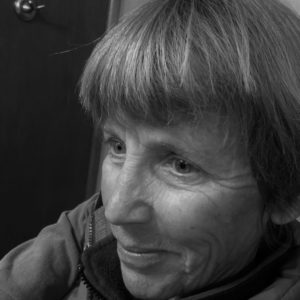Sometimes I just want to tell you who I am and where I come from, forget the need to write and polish a piece for a newspaper column. I want to leave behind my professional training, my writing skills, my accomplishments, and open the heart’s door. I’d start at the beginning if I knew where that was. Oh, so many ways to tell a story. I’ll just say there was a long time in my life when I was on a journey to find my people, to find home.
When I came out in 1982, only ten years had passed since a psychiatrist named Dr. John Fryer donned a disguise at the annual meeting of the American Psychiatric Association and made a statement in protest of the continued designation of homosexuality as a mental disorder. I was unaware of that piece of recent history because I was not looking backward at those who had paved the way. I was twenty-nine years old and relieved and grateful to have found my tribe.
At that time, my tribe of gay men and women was just beginning to grapple with a strange and lethal disease called AIDS, and I found myself in a situation I never would have dreamed of even a year earlier: I was immersed in death. Some weeks, two or three friends died. They died young. It was inescapable. And instructive in a terrible way. One day we were learning how to administer morphine as needed, the next we were training as peace-keepers for the annual Gay Pride march, holding back the rabid “Christians” with their hateful signs and shouted epithets, in order to protect the gay men walking their last walk, enacting their last affirmation of who they were and their right to love.
It was a time, too, in the lesbian community, when we were expected to identify as butch or femme, mimicking the dominant culture we claimed as our oppressor. This made no sense to me, ideologically or personally, for I felt neither male nor female. Gayness, in fact, was my refuge from all that gender conformation, or so I thought. I took to heart the words of a philosopher/psychologist whose name I can no longer remember. She spoke about every person as their own unique gender. Gender was a cultural designation, whereas a person’s sex was all about biology.
I dodged the butch/femme bullet and went about my life, aware of the freedom I felt in a multi-gendered world; a world not divided in two. Once I was labeled “outside the norm,” I was free to act outside it. It was a shifty kind of norm, depending on where you lived and who you talked to. Artists, activists, witches, gay men and women, trans people, people of color, people with AIDS, people with disabilities, anyone in a cross-cultural or multi-racial relationship, anyone marriageable who refused to marry. These were my compatriots. And if it sounds all too familiar to our 21st-century ears, consider that outside-the-norm is always the next place to open up, the next destination, and the next place to be shut down and ostracized once again.
I tell you this in order to create a context for a period in my life when I felt at home. And feeling at home allowed me to feel at peace with my given body. As I saw it, my body lay somewhere on the spectrum between the two artificial poles of male and female. It was universal in a way. It was multi. It transcended cultural limitations. I was finally happy inside it.
But I could well imagine never finding that happiness. Growing up, my brother was my good friend. We played together like two boys. But around age twelve that ended for me. My gender designation ended it. No one would hire me to mow lawns or wriggle under buildings to patch leaky pipes. I had to wear the costumes of my assigned sex, though my body hardly reflected that sex. Anorexia slowed down the process of sexual development, as did a rigid regime of exercise. I was fighting hard not to be a girl, but neither did I entirely want to be a boy. I wanted a boy’s physical strength, and I wanted the freedom to move around in the world without inviting harm. I felt stunned and angry that those advantages would never be mine.
In response, I began to punish myself. The anorexia and compulsive exercise continued. I briefly turned to religion. Years later, when some friends and I met at a public beach to celebrate the end of our undergraduate years, I willed myself to take my shirt off and walk through the sunbathing crowds. I wanted to know if I could still be mistaken for a boy, and when I was by some and not by others, I swallowed relief and shame in equal portions.
I never considered myself trans (in contemporary parlance), and I sometimes wonder if I were growing up right now instead of back then, would that have been the story I told about myself? Would that kind of identification have felt liberating? Constraining? For girls, there’s an age when the happy tomboy dies. If there’s a non-binary or trans kid inside, that’s when they’ll emerge. Too bad they emerge so young into such an intolerant world, a world that puts a target on their back. What I needed at that age was for people to release their vice-like grip on notions of sex and gender, and see the small, strong, capable person I was, a person as valid as every other, a person on their own journey to find home.


